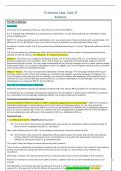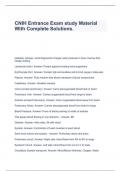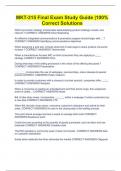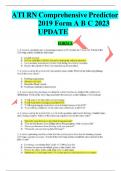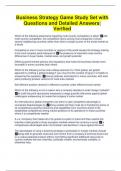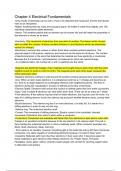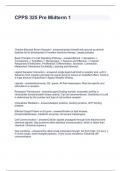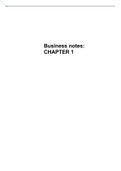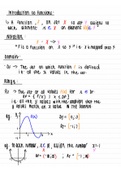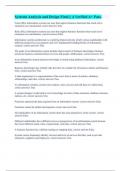Criminal Law: Unit 8
ATTEMPTS
Outcomes
The MR of Attempt
1. Demonstrate a systematic understanding of how the scope of criminal liability extends beyond those who commit
Generally
a crime (the principal offender) to those who attempt to commit a crime or who encourage/assist the principal to
The mens rea of attempt is that you must intend to commit the offence.
commit an offence (secondary parties)
2. Apply your
E.g. if charged comprehensive
with attempting to knowledge of the statutory
cause grievous offence
bodily harm, of attempt
it must to analyse
be proved thatsome factual scenarios
you intended to cause
3. Tackle and solve
grievous bodily harm. problem questions involving secondary parties by critically evaluating whether a range of
defendants have satisfied the AR and MR of accomplice liability
NOTE: The charge would always be attempted s 18 - you would never charge someone with an attempted s 20
offence as, for a s 20 offence, there is no need to prove an intention to cause grievous bodily harm.
People who try but fail to commit an offence can still be criminally liable for their attempt.
In relation to result crimes, the D must intend the prohibited result even if a ‘lesser’ MR would suffice for the full
Those who help or encourage another to commit a crime can also be held liable for that crime under the
offence.
principle of ‘secondary participation’
The D must intend all consequences which form the AR of the full offence (even if recklessness would have
The scope of criminal law is intentionally wide for public policy reasons, to deter and punish those who try to
sufficed for the full offence) (R v Whybrow; R v Millard and Vernon).
commit crimes and those who help or encourage others to do so.
Whybrow - Summary: On a charge of attempted murder, the D must intend to kill (i.e. an intention to cause
grievous
An attemptbodily harm will
to commit not suffice).
a crime Facts: in
is an offence The D wired up a soap dish to the electricity supply in order to
itself.
electrocute and kill his wife. The trial judge misdirected the jury that an intention to kill or cause grievous bodily
It is known
harm wouldas an ‘inchoate’
suffice offence
on a charge (i.e. one which
of attempted murder.is incomplete
On appeal, in
thesome way).
Court of Appeal said that only an intention
to kill would suffice for attempted murder.
Other examples of inchoate offences are conspiracy and intentionally encouraging or assisting an offence.
Millard + Vernon - The D was charged with attempted criminal damage. The trial judge misdirected the jury
that-theyConspiracy involves
could convict if thetwo
D wasor more people
reckless as to agreeing
whethertothecommit an offence
property (e.g.
would be Ian andOn
damaged. Kevin agreeing
appeal, the to
Court ofrob a bank)
Appeal confirmed that only an intention to commit the offence was adequate, and therefore only an
intention
Conspiracy to may
cause becriminal
chargeddamage would
if neither a fullsuffice
offence fornor
a charge of attempted
an attempt criminal
has taken damage,
place, or even though
if the Crown Prosecution
recklessness is an adequate MR for the full offence.
Service thinks that this will be easier to prove than a full offence
The- roleAnofexample
recklessness in attempt
of intentionally encouraging or assisting an offence would be someone suggesting to
someone else that they commit
Where the full offence involves an element an offence (e.g.
of ulterior MR,Ian making
that theMR
ulterior suggestion tofor
will suffice Kevin that theycharge.
an attempt rob a
bank)
If recklessness as to existing circumstances suffices for the full offence, it seems also to suffice for an attempt
Thereattempted
(e.g. are 2 types of scenario
criminal where
damage someone
regarding could be
whether theliable for attempting
property belongs to to commit an offence:
another).
1. An aggravated
Attempted incomplete attempt: Where the D has not done all the acts necessary to bring about the offence
criminal damage
E.g. . if he is arrested
Attorney-General’s before he
Reference completes
(No 3 of 1992) his(‘attempted
assault etc.aggravated criminal damage) - Held: On a charge of
attempted aggravated
2. A complete criminal
attempt: damage,
Where the Dthe
hasDdone
mustall
intend to damage
the acts property
necessary (i.e. he
to commit themust intend
offence but the
the
consequence forming the AR of the
desired result has not followed offence), but he can be reckless as to whether life is endangered because
this is an issue of ulterior MR. There is no need for life to be endangered to establish the AR of the full offence
and
E.g. so
therecklessness will suffice
D laces his victim’s drinkaswith
to this element
poison of MRtoinkill
planning anher,
attempted
but the offence.
victim accidentally spills the contents
of her glass on the floor and so survives because she does not drink the poison
Attempted rape
NOTE: Generally speaking, all indictable offences (those capable of being tried in the Crown Court) can be the
In R v Millard
subject and Vernon,
of an attempt Mustill
charge, but sLJ1(4)
distinguished:
of the Criminal Attempts Act 1981 specifies certain offences which
cannot be attempted.
a) On the one hand, those more straightforward cases where the substantive offence consists simply of
the act which constitutes the AR (i.e. ‘the result’)
The AR of Attempt
Here, when looking at the D’s MR, ‘for an attempt, nothing but conscious volition will do’
The definition under s 1 of the Criminal Attempts Act 1981 requires that the D does an act which is more than
b) preparatory
merely On the othertohand,
the commission of the offence.
where the substantive offence goes beyond one result and one MR, and requires
another state of mind directed to some circumstances or act which the prosecution must prove in
‘An act’addition
(Note: to
not an omission)
proving the result. E.g. attempted rape
‘More
The thantakes
‘result’ merely
the preparatory’ (Rintercourse
shape of sexual v Gullefer: ‘embarked
with a woman upon the crime proper’)
Case law
There seems
is also to suggestcircumstance
an additional that significant steps need
(namely to be
that the takendid
woman towards the commission
not consent), of the
and a state full offence
of mind relative
but, as a matter of law, it is not necessary to establish that the D has done all he intends to
to that circumstance (namely that the D knew she did not consent, or was reckless as to whether she do (Jones).
consented)
Whether an act is more than merely preparatory will be a question of fact (Lord Lane CJ in R v Gullefer),
provided
One thingthe judge feels
is obvious: Thethere
resultis(namely
some evidence
the act that the Dintercourse)
of sexual has ‘embarked upon
must the crimeinproper’
be intended the fullso that the
sense.
matter can be left to the jury.
Proof of an intention to have intercourse with a woman, together with an act done towards that end, is not 1
enough
The defendant must intend sex either knowing of the lack of consent, or being reckless as to the other’s
consent (i.e. the same as for the full offence of rape prior to the Sexual Offences Act 2003) (R v Khan)
, Conditional intent
A conditional intent is adequate MR for an attempted offence.
Impossibility
1. José is a pickpocket. He puts his hand into Lesley’s pocket hoping to steal her purse. Her pocket is
empty.
Impossibility as to ends is no defence to a charge of attempting to commit an offence (section 1(2) of the
Criminal Attempts Act 1981).
José would still be liable for attempted theft. The fact that Lesley’s pocket was empty (and that therefore theft of
the purse is impossible) is deemed to be irrelevant
2. Selena tries to break into a safe using a teaspoon.
Impossibility of means is no defence to a charge of attempting to commit an offence (section 1(2) of the
Criminal Attempts Act 1981)
Selena would still be liable for attempted theft. The fact that the means she had chosen made it impossible to
commit the theft is irrelevant.
3. John thinks that it is a crime to commit adultery. He tries to have sexual intercourse with Maureen (with
her consent) whom he knows to be married.
No criminal offence would have been committed as adultery is not a criminal offence. He cannot attempt a
crime that does not exist.
Impossibility does not prevent the establishment of the MR of attempt (section 1(3)).
The D will be deemed to have the intent to commit a crime if, on the facts which he believed to be true, he
would have had such intent.
R v Shivpuri - The D was arrested carrying a package from India which he believed to contain either heroin or
cannabis. In fact, the substance was harmless and not an illegal drug at all. Held: The D was guilty of attempting
to be knowingly concerned in dealing with or harbouring a controlled drug, even though that was impossible on
the facts as the substance was harmless. The D committed the AR as he did an act (i.e. bringing the parcel into
the country) which was more than merely preparatory to the commission of the offence. Under s 1(2) of the
Criminal Attempts Act 1981, the fact that the commission of the offence was impossible did not prevent the
establishment of the AR of attempt. The D had the necessary intent required to establish the charge of attempt
as, if the facts had been as he believed (ie if the parcel had contained illegal drugs), the requisite intent (to deal
SECONDARY PARTICIPATION (ACCOMPLICE LIABILITY)
A person can be criminally liable if he assists in the commission of an offence in some way.
Such ‘helpers’ are referred to as accomplices, accessories or secondary parties to a crime.
Principal offender: The person who commits the AR elements of the criminal offence.
Co-principals: Where two or more people commit an offence together.
A person can also be charged as a principal offender where he has used an innocent agent to commit the AR of
an offence.
Accomplices: Those who assist in the commission of an offence in some way, whilst not committing the AR of
the offence themselves.
The criminal liability of accomplices is laid down in statute under s 8 of the Accessories and Abettors Act 1861.
Section 8 applies to either way and indictable only offences, but a similar provision exists in relation to
accomplice liability for summary offences under s 44 of the Magistrates’ Courts Act 1980.
The law regards a person who assists in the commission of an offence to be as culpable as the person who
actually commits the offence.
Therefore, a conviction as an accomplice to a crime will attract the same powers of punishment as a conviction
as the principal offender.
2
ATTEMPTS
Outcomes
The MR of Attempt
1. Demonstrate a systematic understanding of how the scope of criminal liability extends beyond those who commit
Generally
a crime (the principal offender) to those who attempt to commit a crime or who encourage/assist the principal to
The mens rea of attempt is that you must intend to commit the offence.
commit an offence (secondary parties)
2. Apply your
E.g. if charged comprehensive
with attempting to knowledge of the statutory
cause grievous offence
bodily harm, of attempt
it must to analyse
be proved thatsome factual scenarios
you intended to cause
3. Tackle and solve
grievous bodily harm. problem questions involving secondary parties by critically evaluating whether a range of
defendants have satisfied the AR and MR of accomplice liability
NOTE: The charge would always be attempted s 18 - you would never charge someone with an attempted s 20
offence as, for a s 20 offence, there is no need to prove an intention to cause grievous bodily harm.
People who try but fail to commit an offence can still be criminally liable for their attempt.
In relation to result crimes, the D must intend the prohibited result even if a ‘lesser’ MR would suffice for the full
Those who help or encourage another to commit a crime can also be held liable for that crime under the
offence.
principle of ‘secondary participation’
The D must intend all consequences which form the AR of the full offence (even if recklessness would have
The scope of criminal law is intentionally wide for public policy reasons, to deter and punish those who try to
sufficed for the full offence) (R v Whybrow; R v Millard and Vernon).
commit crimes and those who help or encourage others to do so.
Whybrow - Summary: On a charge of attempted murder, the D must intend to kill (i.e. an intention to cause
grievous
An attemptbodily harm will
to commit not suffice).
a crime Facts: in
is an offence The D wired up a soap dish to the electricity supply in order to
itself.
electrocute and kill his wife. The trial judge misdirected the jury that an intention to kill or cause grievous bodily
It is known
harm wouldas an ‘inchoate’
suffice offence
on a charge (i.e. one which
of attempted murder.is incomplete
On appeal, in
thesome way).
Court of Appeal said that only an intention
to kill would suffice for attempted murder.
Other examples of inchoate offences are conspiracy and intentionally encouraging or assisting an offence.
Millard + Vernon - The D was charged with attempted criminal damage. The trial judge misdirected the jury
that-theyConspiracy involves
could convict if thetwo
D wasor more people
reckless as to agreeing
whethertothecommit an offence
property (e.g.
would be Ian andOn
damaged. Kevin agreeing
appeal, the to
Court ofrob a bank)
Appeal confirmed that only an intention to commit the offence was adequate, and therefore only an
intention
Conspiracy to may
cause becriminal
chargeddamage would
if neither a fullsuffice
offence fornor
a charge of attempted
an attempt criminal
has taken damage,
place, or even though
if the Crown Prosecution
recklessness is an adequate MR for the full offence.
Service thinks that this will be easier to prove than a full offence
The- roleAnofexample
recklessness in attempt
of intentionally encouraging or assisting an offence would be someone suggesting to
someone else that they commit
Where the full offence involves an element an offence (e.g.
of ulterior MR,Ian making
that theMR
ulterior suggestion tofor
will suffice Kevin that theycharge.
an attempt rob a
bank)
If recklessness as to existing circumstances suffices for the full offence, it seems also to suffice for an attempt
Thereattempted
(e.g. are 2 types of scenario
criminal where
damage someone
regarding could be
whether theliable for attempting
property belongs to to commit an offence:
another).
1. An aggravated
Attempted incomplete attempt: Where the D has not done all the acts necessary to bring about the offence
criminal damage
E.g. . if he is arrested
Attorney-General’s before he
Reference completes
(No 3 of 1992) his(‘attempted
assault etc.aggravated criminal damage) - Held: On a charge of
attempted aggravated
2. A complete criminal
attempt: damage,
Where the Dthe
hasDdone
mustall
intend to damage
the acts property
necessary (i.e. he
to commit themust intend
offence but the
the
consequence forming the AR of the
desired result has not followed offence), but he can be reckless as to whether life is endangered because
this is an issue of ulterior MR. There is no need for life to be endangered to establish the AR of the full offence
and
E.g. so
therecklessness will suffice
D laces his victim’s drinkaswith
to this element
poison of MRtoinkill
planning anher,
attempted
but the offence.
victim accidentally spills the contents
of her glass on the floor and so survives because she does not drink the poison
Attempted rape
NOTE: Generally speaking, all indictable offences (those capable of being tried in the Crown Court) can be the
In R v Millard
subject and Vernon,
of an attempt Mustill
charge, but sLJ1(4)
distinguished:
of the Criminal Attempts Act 1981 specifies certain offences which
cannot be attempted.
a) On the one hand, those more straightforward cases where the substantive offence consists simply of
the act which constitutes the AR (i.e. ‘the result’)
The AR of Attempt
Here, when looking at the D’s MR, ‘for an attempt, nothing but conscious volition will do’
The definition under s 1 of the Criminal Attempts Act 1981 requires that the D does an act which is more than
b) preparatory
merely On the othertohand,
the commission of the offence.
where the substantive offence goes beyond one result and one MR, and requires
another state of mind directed to some circumstances or act which the prosecution must prove in
‘An act’addition
(Note: to
not an omission)
proving the result. E.g. attempted rape
‘More
The thantakes
‘result’ merely
the preparatory’ (Rintercourse
shape of sexual v Gullefer: ‘embarked
with a woman upon the crime proper’)
Case law
There seems
is also to suggestcircumstance
an additional that significant steps need
(namely to be
that the takendid
woman towards the commission
not consent), of the
and a state full offence
of mind relative
but, as a matter of law, it is not necessary to establish that the D has done all he intends to
to that circumstance (namely that the D knew she did not consent, or was reckless as to whether she do (Jones).
consented)
Whether an act is more than merely preparatory will be a question of fact (Lord Lane CJ in R v Gullefer),
provided
One thingthe judge feels
is obvious: Thethere
resultis(namely
some evidence
the act that the Dintercourse)
of sexual has ‘embarked upon
must the crimeinproper’
be intended the fullso that the
sense.
matter can be left to the jury.
Proof of an intention to have intercourse with a woman, together with an act done towards that end, is not 1
enough
The defendant must intend sex either knowing of the lack of consent, or being reckless as to the other’s
consent (i.e. the same as for the full offence of rape prior to the Sexual Offences Act 2003) (R v Khan)
, Conditional intent
A conditional intent is adequate MR for an attempted offence.
Impossibility
1. José is a pickpocket. He puts his hand into Lesley’s pocket hoping to steal her purse. Her pocket is
empty.
Impossibility as to ends is no defence to a charge of attempting to commit an offence (section 1(2) of the
Criminal Attempts Act 1981).
José would still be liable for attempted theft. The fact that Lesley’s pocket was empty (and that therefore theft of
the purse is impossible) is deemed to be irrelevant
2. Selena tries to break into a safe using a teaspoon.
Impossibility of means is no defence to a charge of attempting to commit an offence (section 1(2) of the
Criminal Attempts Act 1981)
Selena would still be liable for attempted theft. The fact that the means she had chosen made it impossible to
commit the theft is irrelevant.
3. John thinks that it is a crime to commit adultery. He tries to have sexual intercourse with Maureen (with
her consent) whom he knows to be married.
No criminal offence would have been committed as adultery is not a criminal offence. He cannot attempt a
crime that does not exist.
Impossibility does not prevent the establishment of the MR of attempt (section 1(3)).
The D will be deemed to have the intent to commit a crime if, on the facts which he believed to be true, he
would have had such intent.
R v Shivpuri - The D was arrested carrying a package from India which he believed to contain either heroin or
cannabis. In fact, the substance was harmless and not an illegal drug at all. Held: The D was guilty of attempting
to be knowingly concerned in dealing with or harbouring a controlled drug, even though that was impossible on
the facts as the substance was harmless. The D committed the AR as he did an act (i.e. bringing the parcel into
the country) which was more than merely preparatory to the commission of the offence. Under s 1(2) of the
Criminal Attempts Act 1981, the fact that the commission of the offence was impossible did not prevent the
establishment of the AR of attempt. The D had the necessary intent required to establish the charge of attempt
as, if the facts had been as he believed (ie if the parcel had contained illegal drugs), the requisite intent (to deal
SECONDARY PARTICIPATION (ACCOMPLICE LIABILITY)
A person can be criminally liable if he assists in the commission of an offence in some way.
Such ‘helpers’ are referred to as accomplices, accessories or secondary parties to a crime.
Principal offender: The person who commits the AR elements of the criminal offence.
Co-principals: Where two or more people commit an offence together.
A person can also be charged as a principal offender where he has used an innocent agent to commit the AR of
an offence.
Accomplices: Those who assist in the commission of an offence in some way, whilst not committing the AR of
the offence themselves.
The criminal liability of accomplices is laid down in statute under s 8 of the Accessories and Abettors Act 1861.
Section 8 applies to either way and indictable only offences, but a similar provision exists in relation to
accomplice liability for summary offences under s 44 of the Magistrates’ Courts Act 1980.
The law regards a person who assists in the commission of an offence to be as culpable as the person who
actually commits the offence.
Therefore, a conviction as an accomplice to a crime will attract the same powers of punishment as a conviction
as the principal offender.
2

